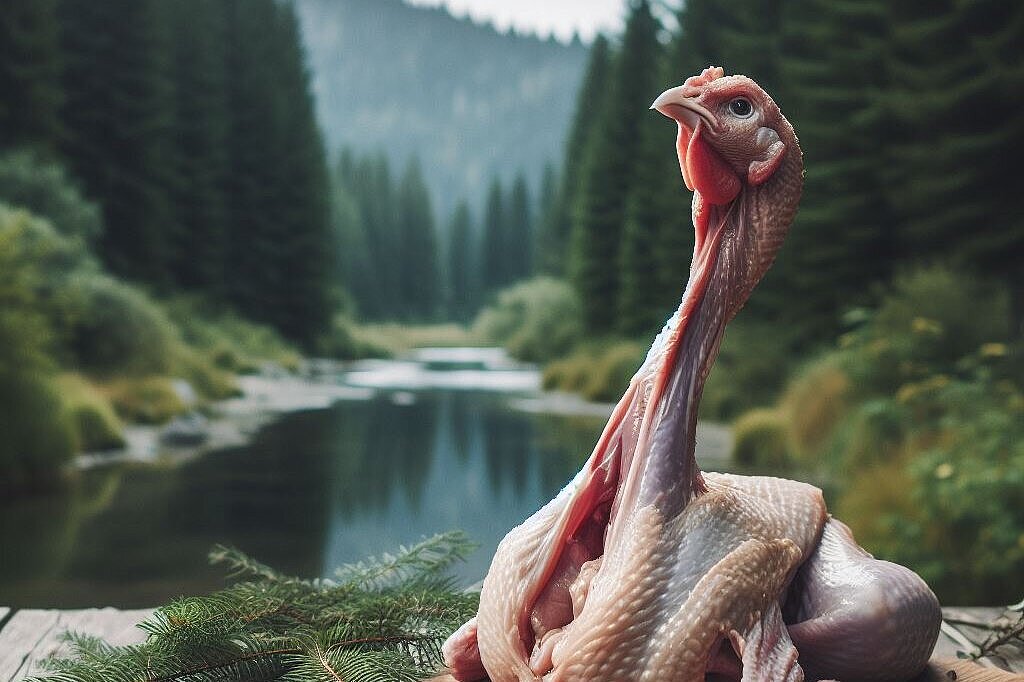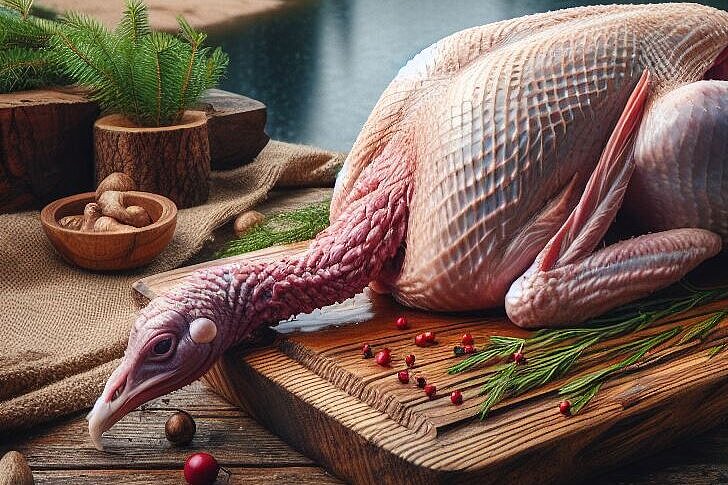Duck necks

What are duck necks?
Duck necks are poultry parts consisting of the neck and head of the duck. They are usually offered dried or frozen and can be fed whole or cut into pieces. Duck necks contain a lot of meat, cartilage and bones and are therefore rich in protein, calcium and other nutrients. They are also relatively low in fat and are therefore suitable for dogs that tend to be overweight.
What are the benefits of duck necks for dogs?
Duck necks have many benefits for dogs that go beyond pure enjoyment. Here are some of them:
- They promote dental health: chewing on the hard bones and cartilage cleans the dog's teeth and massages the gums. This can prevent tartar build-up and gum inflammation.
- They strengthen the chewing muscles: Chewing on duck necks strains and trains your dog's chewing muscles. This can improve jaw health and reduce the risk of jaw problems.
- They aid digestion: Duck necks contain a lot of connective tissue, which acts as fiber and stimulates bowel movements. This can prevent constipation and improve stool consistency.
- They provide important nutrients: Duck necks are a good source of protein, calcium, phosphorus, iron, zinc and other minerals. These nutrients are important for building and maintaining your dog's muscles, bones, blood and immune system.
What are the risks of duck necks for dogs?
Duck necks are not safe for dogs. Here are some disadvantages to be aware of:
- They can cause injuries: If your dog is too fast or too greedy, it can injure itself on the sharp bones or cartilage. This can lead to cuts in the mouth or throat or internal bleeding. In addition, large or unchewed pieces can lead to intestinal obstruction or gastric rupture.
- They can trigger allergies or intolerances: Some dogs are allergic or sensitive to poultry or certain components of duck necks. This can lead to skin rashes, itching, diarrhea or vomiting. If you notice such symptoms in your dog, you should stop giving him duck necks and consult a vet.
- They can lead to an overdose of nutrients: If you give your dog too many duck necks, or too often, they can ingest too much of certain nutrients. This can lead to an imbalance in the mineral balance or acidification of the blood. This can have serious consequences for your dog's health.
Duck fat can promote skin and coat health, improve digestion, strengthen the immune system and increase energy. However, it should be fed in moderation as it can lead to obesity, digestive problems and even pancreatitis. Start with small amounts and feed no more than 10% of your dog's daily calorie intake in the form of duck fat. Use pure duck fat without additives and mix it into the food or use it as a treat.
Properties 3
Are you looking for other ingredients with a specific property?
Just click on them to find more.
If you notice any signs of hypersensitivity or poisoning in your dog, you should see your vet immediately. We are not a substitute for a vet, but we try to be as accurate as possible. Every dog reacts differently and we recommend you get a second opinion or consult your vet if in doubt.
Stay healthy and take good care of your four-legged friend!😊
Similar to Duck necks
Goose necks are, as the name suggests, the necks of geese. They consist of muscle meat, cartilage, skin and bones. Goose necks are usually cut into pieces and offered frozen. They can be ordered in...
Chicken necks are a part of the poultry skeleton consisting of cartilage and meat. They are relatively soft and easy to chew, making them an ideal chew for dogs. Chicken necks are high in protein,...
Turkey necks are the necks of turkeys that are a by-product of slaughtering. They consist of cartilage, meat and skin and contain many nutrients such as protein, calcium, phosphorus and glucosamine....
Duck meat is the muscle meat of domestic and wild ducks. It is a type of poultry meat and has a high protein content. It also contains many important nutrients such as iron, zinc, selenium and B...



